|
This was a match between two leading masters, the Russian born but naturalised German Efim Bogoljubov and the Austrian Rudolf Spielmann. It took place from 7th to 20th January 1932 in the Alpine resort of Semmering. The venue was the Grand Hotel Panhans. Bogoljubov and Spielmann had recently played in the very strong double-rounded grandmaster tournament Bled (1931) (23rd August - 28th September). Spielmann had won their individual encounters by 1½ to ½, although Bogoljubov had outpaced him in the general competition coming second with 15 points as compared to Spielmann's tenth place with 12.5 points. "The competition held in the Grand Hotel Panhans, Semmering,
the match Bogoljubov-Spielmann ended 4:3 with 3 draws in favour of the Austrian master. Out of ten games, there were only three draws and even by mere chance - that's surprisingly few!" (1) Semmering
"What is declared will be the largest resort in Europe is being constructed at Semmering, 60 miles from Vienna Austria. William D. Zimidin, a Latvian businessman leads a syndicate which is reviving Semmering, once a popular resort but which had slumbered for years until Zimidin bought one of the leading hotels. He spent $1,500,000 in building an open air swimming tank ... His other plans for the resort include an aerodrome, a service of "railbuses" to rush visitors from Vienna at 75 miles per hour, a huge athletic stadium, a casino and numerous beauty contests." (2) Semmering was beginning to attract prestigious foreign visitors, and later in the year the American author Sinclair Lewis took a "cozy villa" outside of the town. (3) Bogoljubov
Bogoljubov was the challenger in the Alekhine - Bogoljubov World Championship Match (1929), and was the German champion. He came second to Alexander Alekhine, albeit 5½ points behind, in the very strong Bled (1931). His peak performances were in 1928-1936. (4) Alekhine would choose him as challenger again, in the Alekhine - Bogoljubov World Championship Rematch (1934). After the 1929 encounter it was clear that Bogoljubov was no match for Alekhine, and his score to date against the one seen widely as the most credible contender, Jose Raul Capablanca, was a miserable +0 =1 -5. Bogoljubov was still an extremely strong grandmaster. His score against Akiba Rubinstein was 14 to 13, with 10 draws, and against Aron Nimzowitsch 8 to 6, with 4 draws. Spielmann
Spielman's peak was in the late 1920's, his greatest tournament triumph being Semmering (1926), which he won ahead of a very strong field including Capablanca. Other notable results from this time included Berlin (1928), where he took third place behind Capablanca and Aron Nimzowitsch, and Karlsbad (1929), where he was equal second with Capablanca, behind Nimzowitsch but ahead of such formidable opponents as Rubinstein, Max Euwe and Bogoljubov. Schedule of the match Game 1 - 7th January, Wiener Schach-Zeitung, Nr. 5, March 1932, p. 69
Game 2 - 8th January, Wiener Schach-Zeitung, Nr. 2, January 1932, p. 23
Game 3, - 9th January, Wiener Schach-Zeitung, Nr. 3, February 1932, p. 37
Game 4 - 10th January, Wiener Schach-Zeitung, Nr. 5, March 1932, p. 73
Game 5 - 13th January, Wiener Schach-Zeitung, Nr. 5, March 1932, p. 72
Game 6 - 14th January, Wiener Schach-Zeitung, Nr. 4, February 1932, p. 57
Game 7 - 16th January, Wiener Schach-Zeitung, Nr. 5, March 1932, p. 74
Game 8 - 17th January, Wiener Schach-Zeitung, Nr. 4, February 1932, p. 58
Game 9 - 19th January, Wiener Schach-Zeitung, Nr. 3, February 1932, p. 35
Game 10 - 20th January, Wiener Schach-Zeitung, Nr. 3, February 1932, p. 36 The progress of the match 1 2 3 4 5 6 7 8 9 0
Spielmann 0 0 ½ 1 1 ½ 1 ½ 1 0 5½
Bogoljubov 1 1 ½ 0 0 ½ 0 ½ 0 1 4½
Progressive score: 1 2 3 4 5 6 7 8 9 10
Spielmann 0 0 ½ 1½ 2½ 3 4 4½ 5½ 5½
Bogoljubov 1 2 2½ 2½ 2½ 3 3 3½ 3½ 4½
Spielmann was White in the odd-numbered games.The victor reflects "To appreciate the result, we can do no better than give the winner Rudolf Spielmann's own words from the "Münchener Schachzeitung": My victory over the German Champion surprised me as well as my opponent and the whole chess world. Not that I'm too modest ... but if you consider Bogoljubov's tournament successes, his great opening knowledge and the inexhaustible freshness of his style, you would have to allow him the better prospects. .. In most of the games he more or less outplayed me, but he underestimated both my concentration and my resilience. Being a melancholy person, if I begin poorly I usually brood on failure, but this time I held it together. Of course, that was not a coincidence. We only played for six hours a day. There was sufficient time to relax, there was nice weather and beautiful mountains. This was everything I love and which I needed to mentally and physically recover. Bogoljubov was too optimistic this time. Optimism has brought him many great successes but he also has his own demons. Bogoljubov only rarely obliged himself to take the necessary care in advantageous positions. His three winning games were, without a doubt, masterpieces. It is woe to any opponent of Bogoljubov once he soars into his most superb form, but throughout the Semmering match, he only achieved this in these three games! I am glad that I now have this arduous struggle behind me and that I have emerged the victor. I feel as though I have received a New Year's gift from the Gods!" (5) There were few gifts awaiting Spielmann in the 1930's. Austria became increasingly unstable, caught between the aggressive Fascist powers Germany and Italy. Spielmann spent long periods in Holland whilst the situation for Jewish Austrians became ever more precarious. Later in 1932, Nazi outrages reached even rural Semmering: "hundreds of shots were exchanged within a few minutes, and the dead and wounded fell quickly." (6) Bogoljubov in Vienna "After the end of the Semmering match, Bogoljubov's sojourn in Austria offered Hietzing, the great Viennese chess club, a welcome opportunity to invite him to an interesting event. On the 23rd January, the Grandmaster was in Vienna for an interview at the radio station with the master Hans Müller. Then at the Hietzing Chess Club, he gave a ten game simultaneous exhibition against its best players. The severity of the task can be seen in the names of his opponents: the champions H. Müller, Eliskases, Döry, Grünfeld (junior), Igel, the master contenders Haberditz, Hoffmann, Kolnhofer, Dr. Metänömski, Kokäja (the latter a Circassian and a Turkish captain) .. 5 wins, 2 losses, 3 draws. It must be said that Bogoljubov played excellently. His performance was all the more impressive as he played pretty quickly and all the games were finished under four hours ..." (7) The games
Game 1 - Spielmann lost the first game despite having the White pieces. A succession of inaccurate moves and small blunders degraded his position and led to a Rook and Pawn endgame in which he was a Pawn down. Bogoljubov's Rook was active and his King had penetrated as far as <g3> when Spielmann resigned. Game 2 - Bogoljubov's second win a row. Spielmann defended in a Queen's Gambit Exchange variation in which both players castled Queen-side. Bogoljubov established a pawn on <e6> and a Knight on <d7>, 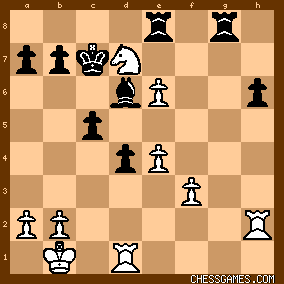
click for larger viewand Spielmann was on the defensive with no counterplay. With no way to prevent the inexorable advance of these pawns Spielmann resigned. Game 3 - Bogoljubov played a QGD Meran variation and won a Pawn leading to a Rook and Pawns endgame where he had a draw in hand and a small chance to score a third win: 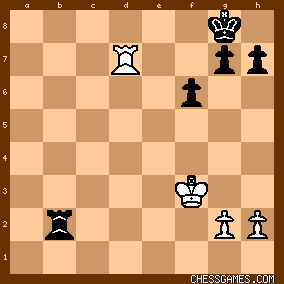
click for larger viewSpielmann held the ending providing further evidence that "with Pawns only on one side, a one Pawn advantage is insufficient to win" (8) - see Endgame Explorer: RPPP vs RPP Game 4 - Bogoljubov played a natural but extremely careless move and lost in the opening. "To understand the following game, you need to be acquainted with the accompanying circumstances. Bogoljubov, who had begun this match so promisingly ... played the opening quickly, with his attention focused mainly on his breakfast. The consequences of this soon became apparent ... No sooner had Bogoljubov played this move than he choked ..." (9) By castling King-side, he lost a piece: 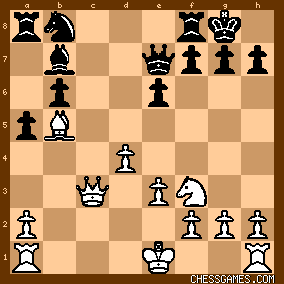
click for larger viewGame 5 - Spielmann won again, but in this game Bogoljubov did not obligingly gift him the point. Spielmann worked up a King-side attack, 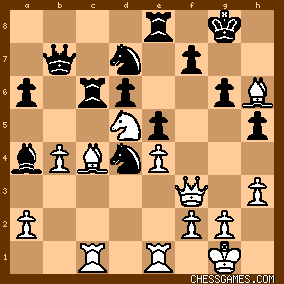
click for larger viewand with 30.Nf6! he quickly won. The match was now tied. Game 6 - Bogoljubov should have won this game, having achieved a dominating position: 
click for larger viewWith 39.d7+! he would have taken the point. Instead, he missed this and then failed to take advantage of Spielmann's shaky defence. What could have been a resounding victory fizzled out into a draw. Game 7 - Bogoljubov defended with a Sicilian Defence. He played the opening poorly, and his King became stranded in the centre. Spielmann's play was again prone to inaccuracies, but his advantage was sufficient to lead to an eventual win. Game 8 - "Nothing characterizes this game better than Bogoljubov's own words: "Another nice game thrown away!" (10). As in Game 6, Bogoljubov achieved a fine position as White but could not capitalise on it: 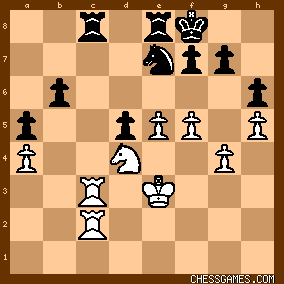
click for larger viewHe failed to break open Spielmann's King-side and once again a promising middle game only yielded Bogoljubov a half point. Game 9 - Bogoljubov, with Black, was determined to win this game from the opening. Unfortunately, that determination soon over-took the bounds of prudence. He threw his King-side pawns forward 
click for larger viewSpielmann sacrificed a Knight for a mobile pawn centre and a spectacular attack. Spielmann's tactical fireworks were probably unsound, but over the board they proved too much for Bogoljubov who was a greater attacking player than a defender. Bogoljubov's King stranded on <e7> ended up in a mating net. Game 10 - Having lost four of the last seven games, and two from very promising positions, it might be expected that Bogoljubov would have any appetite for further competition. Bogoljubov did not give up and he smashed his way through Spielmann's King-side. Whilst this was an emphatic win, it once again illustrated the poor defensive play that characterised both masters in this match. Notes
(1) Wiener Schach-Zeitung, Nr. 3, February 1932, p. 33.
(2) Hartford Courant (Hartford, Connecticut), 25th November 1932, p. 15.
(3) The Tampa Times (Tampa, Florida), 23rd November 1932, p. 5.
(4) Chessmetrics, Efim Bogoljubow page (http://www.chessmetrics.com/cm/CM2/...)
(5) Wiener Schach-Zeitung, Nr. 5, March 1932, pp. 74-75.
(6) Bradford Evening Star and The Bradford Daily Record
(Bradford, Pennsylvania), 17th October 1932, p. 4.
(7) Wiener Schach-Zeitung, Nr. 3, February 1932, pp. 59-60.
(8) Practical Rook Endings, Mendis, p. 32.
(9) Wiener Schach-Zeitung, Nr. 5, March 1932, pp. 73-74.
(10) Wiener Schach-Zeitung, Nr. 4, February 1932, p. 59. This text and original research by User: Chessical. Games 7 and 8 were submitted to Database to complete this collection.
|




![]()
